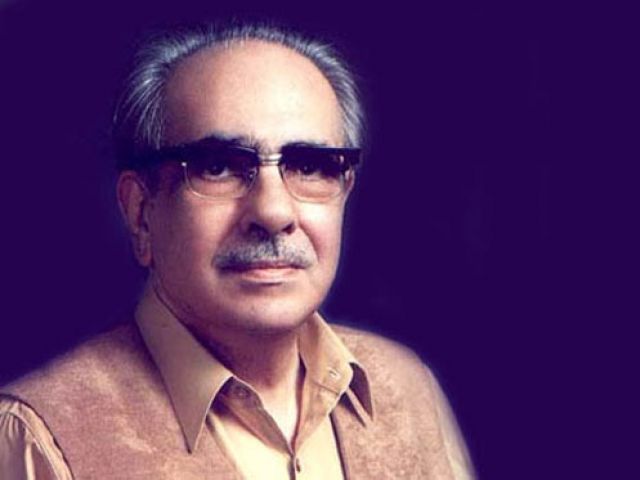
Jamiluddin Aali, lovingly called Aaliji, was an ambitious man with an undying, never-ending lust for fame and prominence. More than that he was an enigma, a man of many contradictions, eluding any fair assessment of his personality. His was a life full of achievements. He was a successful man as a careerist, as a poet and as a writer. But he was never sure of his successes and always remained a dissatisfied man suffering from an internal strife, restlessness and a fear of being consigned to oblivion.
Born on January 20, 1925 in Delhi as Nawabzada Mirza Jamiluddin Ahmad Khan, Aaliji did not have pleasant memories of his childhood days. His mother, a direct descendant of Khwaja Mir Dard, was the fourth wife of Sir Amiruddin Khan, the Nawab of Loharu, a princely state in northern India. Aali was hardly 11 or 12 years old when his father died and the family was obliged to manage life on a meagre stipend allowed by the British-India government.
Poet Jamiluddin Aali passes away in Karachi
Poetry was the first love of Aali for the vocation had since long been there in the family having ties of kinship with Mirza Ghalib. He started composing poetry at an early age. He referred his early compositions to Nawab Sirajuddin Khan Sail Dehlavi to learn the techniques of the art. Beginning as a ghazal poet he turned to doha after he fell in love with Tayyaba Bano whom he married in 1944. By the time he graduated from Delhi’s Anglo Arabic College in 1944, Aali had already earned for himself a name as a poet.

He along with his family migrated to Pakistan in 1947 and started his career as an assistant in the Ministry of Commerce. In 1951 he cleared the Central Superior Service examination to join the Pakistan Taxation Service. He was Officer on Special Duty at President House from 1959 to 1963. After serving as Registrar Copyright at Ministry of Education and Secretary National Press Trust, he joined National Bank of Pakistan and remained there till his retirement.
But his was a restless soul. The recognition and admiration he earned for his poetry would not quench his perennial thirst for fame and prominence. He always wanted to be in limelight and loved to be amidst one or the other controversy. But the controversy he was caught up in the early days of Ayub Khan’s martial law regime continued to haunt him all through his life. As the story goes, Aali along with his few friends initiated a move in 1959 to set up what later turned out to be the Writers Guild. However, those who censure Aali for this ‘unholy sin’ were never fair in their criticism. These detractors while trying to defame Aali forgot that almost all the known poets and writers on either side of the ideological divide were very much on board in this project and became its founding members. They, however, thought that this ‘trade union of writers and poets’ would be used as a tool and propaganda machine in furtherance of the objectives of martial law regime. What added credence to these misplaced apprehensions was Aali’s posting as Officer on Special Duty at Ayub Khan’s secretariat.
But this would not dampen his spirits. He had the capacity and the ability to outwit all his detractors and critics. With his God-gifted talent for creativity, he invoked the muses and proved that he was unbeatable.
Faiz Ahmed Faiz (1911-1984): The poet of commitment
Those were turbulent times when Aali started writing poetry. The Progressive Movement was there and its proponents were out to challenge the status quo. For this new breed of writers and poets, the cultural, social and literary traditions of the past were meaningless and devoid of the potential to meet the demands of modern age. The ghazal which symbolised most the values and norms of the society naturally became their prime target. It was already being threatened by the movement of modern poetry spear-headed by Altaf Husain Hali and Muhammad Hussain Azad under the patronage of British-India government.
All this did not impress Aali and he would not subscribe to the agenda of either of the two movements. Instead he set himself out to compose ghazals. Though adhering to the traditional form of the craft, his was a fresh voice. He soon developed his own diction with evocative imagery and a lyricism that was unique. But he shows his real potential and creativity in dohas.

Gifted with a melodious voice and an understanding of classical music, Aali would take the listeners to a state of ecstasy and leave them in trance. His poetic sensibility is better captured and expressed in his dohas than his ghazals. Though laden with erotic themes, there is no lewd sentiment or base thought in his dohas. He broke new grounds while experimenting with its form and technique which he would later referred to as Aali Chaal (Aali’s style or innovation). Aali deviated from the centuries-old strict rules of Hindi doha and took the genre to new heights by redefining its thematic boundaries and altering its form. A considerable part of his ghazals and dohas is autobiographical. But elsewhere social sensibility and concern about the contemporary issues also find expression.
His most original and greatest contribution to the world of literature is his long poem Insan. Though still incomplete, it took Aali more than five decades to write more than 10,000 lines. Such dramatic, allegorical poems had their origin in ancient Greek drama. But it was rarely used even in Western literature and had no precedence in Urdu at all. Crafted on the pattern of drama, Insan is divided into different acts or cantos which merge with each other lending it a thematic and contextual unity. It is indeed a superb mix of dialogue, monologue, soliloquy and narrative and all these techniques are deployed to retain the variety and peculiarity of expression to suit the demands of different characters.
Aali also composed songs or geet and a few of his national songs, like the anthem he wrote for the first summit of heads of Muslim states in 1974 or the Jevay, Jevay Pakistan, earned him laurels. These unconventional songs are remarkable for their lyricism and rhythmical tone.
He was a prolific writer of Urdu prose as well. He wrote hundreds of forewords for the books published by Anjuman Tarraqi Urdu. His travelogues, which were serialised in Urdu daily Jang, have been published in three volumes. Besides from 1967 till 2010 he wrote a regular weekly column for the same Urdu daily. Contrary to his poetical compositions, he cared less for the clarity of thought and sanctity of language in his prose writings which were more journalistic and hardly literary. But few of his forewords not only indicate the depth of his scholarship and comprehension of the literary subjects but also reveal how good a writer he could be when he wanted to be. His essay on Sail Dehlavi is simply an outstanding literary piece and a real contribution to the art of sketch writing in Urdu literature.
There is another side to his personality and that is the role of a crusader and saviour he played for the establishment and growth of a number of institutions in the field of education, literature and language. Never willing to accept defeat for his commitments, especially when it came to the issues of Pakistan and Urdu, Aali fought many battles, earned the hostility of many, but ultimately managed to have his way.
He took pride in being the successor of Baba-e-Urdu Moulvi Abdul Haq and saw to it that his mission was carried forward and his dreams were realised. It is another agonising chapter of Aali’s life when he manoeuvred and fought in the corridors of power and out-witted all the schemers who had planned to sideline Moulvi Abdul Haq and to deprive Urdu of its national status. How he struggled to save Urdu College when it was nationalised in 1972, how he struggled for its survival and later to take it to the status of a university is a long tale and subject of another article.
The Anjuman Tarraqi Urdu is another institution that would have died long ago had Aali not been there at the helm of its affairs. He took over as honorary secretary of the Anjuman after the death of Moulvi Abdul Haq in 1962 and did everything humanly possible to ensure its survival and growth. (He has left the seeds for another controversy behind that may haunt him even after his death, i.e. his decision to ‘bequeath’ the Anjuman Tarraqi Urdu to his son.)
Aali could also be credited as a saviour of the grand 22-volume Urdu Lughat project of the Urdu Dictionary Board.
It is, however, not known how and why Aali drifted into politics. Was it once again his impulsive behaviour for fame and prominence or there were some other unavoidable and inescapable compulsions? Aali would always evade questions about this side of his personality. What this writer can gather, Aali never wanted to swim in this ocean, the depth of which he did know.
In Memoriam: Jaun Elia, the defeatist who won us over
He was ‘compelled’ to contest the 1977 National Assembly elections on Pakistan Peoples Party ticket only to lose to Munawwar Hasan of Jamaat-e-Islami. His second stint in politics was when in 1997 he became a Senator as a nominee of the Muttahida Qaumi Movement.
more than a poet
A fighter for a cause!
It was the morning of February 7, 2005. I was still in bed after my routine work at night when I received a phone call from Dr Rauf Parekh asking me to ‘immediately’ see Dr Farman Fatehpuri. Though not knowing what the actual problem was, I sensed the ‘urgency’ and rushed to the office of Urdu Dictionary Board.
As soon as I entered the office of Dr Farman, and before I could settle myself on a chair across his table, he told me, “You must do something to save this project.” He then showed me some letters/faxes from Islamabad which indicated that the government intended either to merge the Board with some other organisation or to wind it up. I asked for the copies of these letters so that I could run a story. To this he said no and even refused to come on record in this regard. “How can I help you Farman Sahib in this situation,” I asked. “That is your headache,” he said adding that “but you have to do something.” This naturally left me puzzled. Immediately a thought occurred to me that Jamiluddin Aali could be of some help. I asked Dr Farman that did he speak to Aaliji. “No. But you may do it,” he told me adding further to my annoyance. Not really understanding the apprehensions or fears of Farman Sahib, I contacted Aaliji from my mobile phone asking if I could see him immediately. He was at Urdu university and asked me to come over there.
I found him in his office resting on a mattress in a corner of the room. He was not well and was running temperature. As I told him the whole story, I realised that he already knew about it but was not much keen to take any initiative. “Why Farman himself cannot take up the matter? Tell him to hold a press conference and expose the whole conspiracy; only then I will see what I can do,” Aaliji said with a visible distaste on his face. I tried to make him understand the compulsions of Dr Farman and other officials of the Board. He would not buy these explanations and almost dismissed me with a firm declaration: “Then I cannot do anything.” But I had known Aaliji since long and knew some of his weaknesses. “Look Aaliji, you claim to be the custodian of the legacy of Moulvi Abdul Haq and this Urdu Lughat was still an unrealised dream of Baba-e-Urdu. Will you let it shatter like this?” That worked. With his eyes fixed on me he seemed tense and lost for a few moments. But soon he was in his usual self and said to me: “This is emotional blackmail but you a have a point there and I will see what I can do.” After a long pause, Aaliji told me “there is an inaugural function of Saknan-i-Shahr-i-Quaid Trust today. Some ministers and other government officials are expected there. Since I am not well, I had regretted to the organisers. But now I will go there and you will see what I do.” My mission accomplished, I sought his leave. But there was something else on Aaliji’s mind. It was now his turn to blackmail me. Probably knowing well that I avoid such gatherings, he told me in a very firm voice: “You also have to be there personally and must ensure that I am ‘lead’ on your page.” I agreed.
And Aaliji lived up to his promise. Taking advantage of his sickness, he convinced the organisers to be the first speaker. Once on the rostrum, he thundered and roared attacking the government with all the rhetoric at his disposal for its nefarious designs about the Urdu Lughat and the Urdu Dictionary Board. As he set the tone for succeeding speakers, the organisers complained that Aaliji had spoiled their function. Immediately after his speech but before leaving the venue he came to me in the back rows. “Was I up to the mark?” he asked and I simply thanked him. He did not stop here. In the following days he used all the might of his tongue and pen to plead the case of Urdu Board and could rightly be credited as a saviour of the 22-volume Urdu Lughat project. AH
Published in The Express Tribune, November 24th, 2015.
Like Life & Style on Facebook, follow @ETLifeandStyle on Twitter for the latest in fashion, gossip and entertainment.




1716998435-0/Ryan-Reynolds-Hugh-Jackman-(3)1716998435-0-165x106.webp)










1730706072-0/Copy-of-Untitled-(2)1730706072-0-270x192.webp)
COMMENTS (2)
Comments are moderated and generally will be posted if they are on-topic and not abusive.
For more information, please see our Comments FAQ